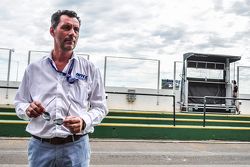WTCC looks to decrease costs in next homologation cycle
WTCC promoter Francois Ribeiro says he is mindful of supporting the independent teams in the championship, as rumours swirl that the privateer Chevrolet contingent could be depleted next year.

Citroën Communication













In order to check the matter, the Touring Car Commission is looking at ways to reduce costs for the next Super 2000 TC1 regulation cycle.
The World Touring Car Championship will add another premier manufacturer partner next year, with Volvo Polestar Cyan Racing joining the field with a pair of Volvo S60s.
But Ribeiro, who has helmed the WTCC for the last two years since the departure of Marcello Lotti, says privateers and avoiding escalating costs are at the forefront of his mind.
“We are starting to discuss the new parameters of the homologations which will go from 2017 to 2019,” said Ribeiro.
“TC1 regulations must remain as they are, but there are a few things we can adjust, in particular, cost control measures.
"Last week we decided to monitor the situation with the Touring Car Commission and avoid the escalation of costs because in the end WTCC is not a technology showcase as Formula 1 is."
Elaborating more, he said: “If you look at the Le Mans 24 Hours, where manufacturers can come in with different concepts, that’s interesting but a whole different world compared to what we do.
"In the interpretation of the rules we need to be very careful to avoid any tweaks which would make the cars quicker but would add nothing to the show.”
Ribeiro says specifically it’s the rising cost of engine development which is the main concern, with Citroen’s 1.6 turbocharged engine having set a strong benchmark.
Honda and technical partner Mugen have invested heavily in improving the performance of their engine to match Citroen, while the independent teams using the Chevrolet RML’s once all-conquering Global Racing Engine have fallen behind due to development cost limitations.
“(This) is the less visible part for the public," explained Ribeiro. "You can easily gain a second per lap with more sophisticated engine management, but you can spend millions and gain nothing in terms of show.
“We are starting to debate this with the FIA, and the private teams are involved in these discussions, because the last thing we want is to make the championship lose its cost-effective nature in terms of media coverage versus investment, which I believe we still have compared to other championships such as the World Rally Championship, the World Endurance Championship or Rallycross.
"If we let the costs inflate too much we will lose that ratio, privateers will struggle and the WTCC would be badly hurt in that situation.”
Between 2014 and 2015, the privateer field failed to grow. Although Craft-Bamboo Racing rejoined the championship with a single car programme after a year away, Munnich Motorsport slimmed down to a one-car effort and has foregone investing in RML’s latest suspension and engine upgrades unlike ROAL Motorsport and Campos Racing.
Meanwhile, the WTCC’s longest serving independent team, Proteam Racing, left the championship after one race, having no budget to continue following the shock departure of Dusan Borkovic due to a quality of parts dispute heading to court.
Another returning privateer team, Nika Racing, rested former BTCC and STCC champion Rickard Rydell for two races, taking up a financial incentive to run Argentinian star Nestor Girolami in their new build Honda Civic, before running out of budget to complete the season, leaving the championship at the end of the European leg.
“We will give (the independents) more support next year,” said Ribeiro. “We need to keep them on board. We are studying a series of measures in the Touring Car Commission to save them some budget, and keep them as much as possible on the grid.
"By definition the manufacturers come and go, when they come they love you, and when they leave they don’t look back in their mirrors.
"That is why independents will always be important in the World Touring Car Championship.”
Pietro Casillo/TouringCarTimes
Be part of Motorsport community
Join the conversationShare Or Save This Story
Subscribe and access Motorsport.com with your ad-blocker.
From Formula 1 to MotoGP we report straight from the paddock because we love our sport, just like you. In order to keep delivering our expert journalism, our website uses advertising. Still, we want to give you the opportunity to enjoy an ad-free and tracker-free website and to continue using your adblocker.







Top Comments